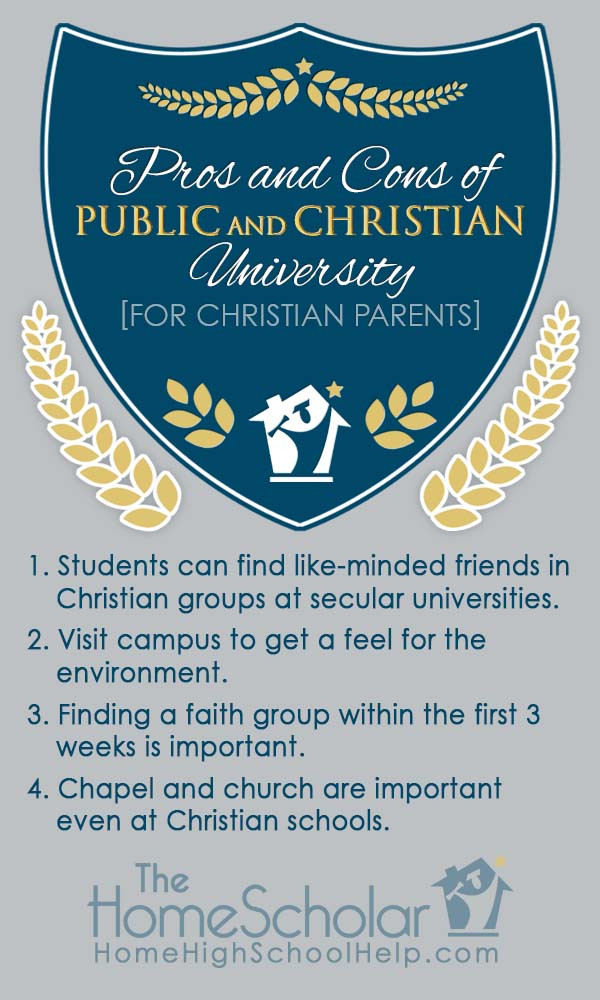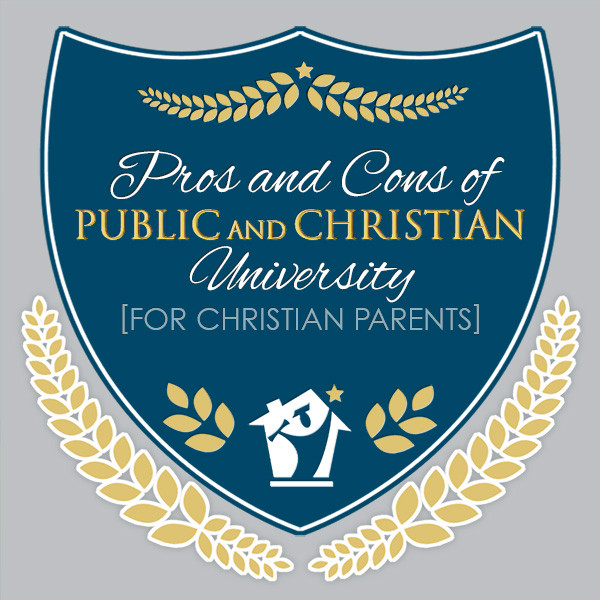Why should Christian families apply to both public and private school? It’s complicated, so pay close attention.
I encourage parents to apply to both public and private universities. Learn insider secrets that will give confidence and remove stress and guide you to your family’s best possible choice in my short eBook: Finding a College You Love.
The cost of private Christian university, private secular university, and public university can be the same, when you take into consideration scholarships. The reason is that private colleges have lots of money to give away, and public colleges are tied to state budgets, which means they often have little or no money to offer. If a student doesn’t receive scholarships, however, then public university is usually the most affordable option.
At a Christian university, the professors might not have the same views as the parents, the curriculum may not match your beliefs, and the student population may not be Christian at all. Frankly, many parents send kids to Christian colleges hoping it will straighten them out. It can be very confusing for a young Christian to see a different view of Christianity that is nothing like what their parents taught them, and see kids in college who say they are Christian but don’t act like it.
On the other side, at a public or private secular school, a young person expects to encounter mostly secular professors and students. In order to find a faith-based family, they understand quickly that they need to find a group of like-minded people in an activity or church group. It can be less of a shock to expect secular people to act like secular people. So, if secular college is more affordable and can meet your needs, it might not be as challenging as you would expect. Just find a Christian group for your child to join.
Try to find an environment that is wholesome enough to support independent living. Don’t look just at the name of the college. Texas Christian University is often listed as one of the top 10 party schools! The name means nothing! Visit each college to see if it’s wholesome enough, even if it’s not Christian. For example, when my husband had his high school reunion, it was at a bar. We didn’t hesitate, we attended, and it didn’t hurt me. At the same time, I wouldn’t want to LIVE in a bar, day in and day out, for four years.
When your child attends college, they are actually an adult, and adults live and work in secular environments all the time, without facing serious consequences. Think of the Apostle Paul. He worked as a tent-maker, interacting with tradesmen on a daily basis. My husband worked in marine construction with long shore-men, who actually do swear like long shore-men, and I’m sure that’s what Paul experienced. The Apostle Paul also mixed it up with the elite and educated Romans – much like the secular colleges of their time. And he interacted with the religious educators of the day (the Sadducees and Pharisees) discussing the nuances of faith and religion. When your child is an adult, they are called to do as Paul did – go into all the world. And whether that means the trades, Christian college, or secular university, adults are called to go into all the world.
Let me explain it another way. Going to a Christian college is not statistically tied to helping students remain a Christian. Going to church while being in college is statistically tied to maintaining faith. Going to church is what matters, so finding a university with a good church is an option. The Bible is quite clear about avoiding debt, and is quite clear about going into “all the world” not just going into the safety of the Christian world. Avoiding college debt by attending a public university may be a good plan or back-up plan.
Remember, it’s not that homeschooling has changed, or that the world has changed. We let them go into the world because our child has changed. They are adults, and, hopefully, give up their childish ways.
There is one important tip for college that will help. Research shows that if students find a faith-group within the first 3 weeks of school, they are more likely to retain their faith, regardless of whether the college is secular or Christian. Spend some time looking at each college, making sure it’s wholesome enough to live there. And, as I’ve mentioned, find a group of like-minded people, so your child has a group to join when they first arrive on campus.
When visiting and collecting information, find out if your university has a local student ministry program to join. Some of the well-established programs are InterVarsity, CRU (previously called Campus Crusade for Christ) and RUF (Reformed University Fellowship). There may be other regional or campus-specific programs your student can connect with too. Remember that even at Christian schools, it makes a big impact on the student’s faith when they can get plugged in to a Bible study and attend chapel or a local church. Encourage your student to find that engagement and support while they’re getting settled in at the school
Apply to a combination of Reach, Fit, and Safety schools, both public and private. Learn more about the differences these schools in my article, Reach, Fit, and Safety Simplified.
If college is your plan, I think you’ll love my book, The HomeScholar Guide to College Admission and Scholarships. You can relax with this book – it’s like a casual conversation, sprinkled with scripture, humor, valuable tips, and quotes from The Princess Bride! Whether you’re trying to understand entrance requirements for college for your first graduate, or learning new tactics for your second, there are countless treasures in this book.
I hope this helps put your mind at ease if you’re a Christian considering a public university. There’s lots to consider, but you can successfully navigate this journey.






I think this advice is very sound. I’d only add the encouragement to contribute to the financial support of the campus ministry leaders or fellowship once your student has gotten connected, when you can. Most of them raise support like missionaries and you will be supporting the folks who are serving your college student and his/her campus! Support raising is hard; you can help ensure that the ministry will continue, especially while your child is on campus.
Julie,
Thank you for the great idea! It’s good to remember things like this.
Jennifer, Assistant to Lee